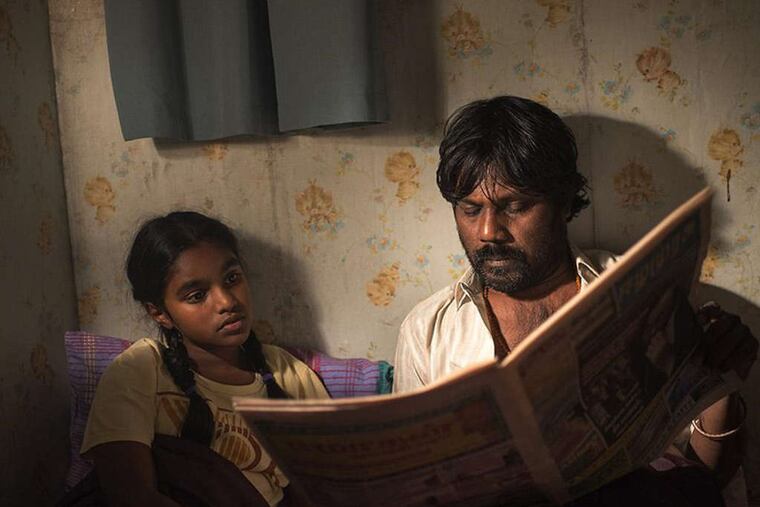French film 'Dheepan' takes top prize at Cannes
CANNES - The French threw the world a film party and then ate the cherry on top of the dessert.

CANNES - The French threw the world a film party and then ate the cherry on top of the dessert.
Dheepan - about a Tamil Tiger who quits the Sri Lankan revolution, creates a makeshift "family" with two other refugees, and flees to Paris, where he lands a job as a building superintendent in the lawless suburbs - took the Palme D'Or, the Golden Palm, at the 68th Cannes Film Festival Sunday night.
The film by Jacques Audiard, whose jailhouse story A Prophet won second prize in 2009, was one of a huge contingent French films figuring prominently in the competition for the top prize (and in other sections at well).
Dheepan beat out the consensus critical favorite, Son of Saul, a Hungarian film by first-time director Laszlo Nemes, about a Jewish worker, or Sonderkommando, inside the gas chambers at Auschwitz during the last days of World War II. It entranced critics, who gave it a real chance to be the first debut film to take the Palme D'Or since 1989, when Steven Soderbergh's sex lies and videotape was the winner.
There was palpable disappointment in the Salle Debussy, where the press was viewing the closed-circuit telecast of the Palmes, when Son of Saul was given the Grand Prix - second prize. That indicated Dheepan - regarded by many as a minor film that takes a late right-hand turn into cowboy-sheriff-vigilante territory - was crossing the finish line in first place.
The jury was presided over by the Coen Brothers, Joel and Ethan, who have won more than their share of Golden Palms here. As copresidents, they led a jury of two directors, five actors (including Jake Gyllenhaal and Sienna Miller), and a composer from Mali.
"The decision sounds like a split jury compromise," said one veteran critic.
Hou Hsiao-Hsien of Taiwan was named best director for The Assassin, a story about a female hitman who must choose between family and duty. Set in ninth-century China, the story proved so complex for non-Chinese viewers here that many thought its cinematographer, Mark Lee Ping Bing, would win for the film's astonishing look.
Rooney Mara upset costar Cate Blanchett for best actress in Todd Haynes' Carol. Based on a 1952 novel by Patricia Highsmith published under a pen name, it's about a lesbian affair between an upper-class suburbanite and a shopgirl in the early 1950s.
Mara shared the award with French actress Emmanuelle Bercot, who in Mon Roi (My King) plays a woman whose ski accident lands her in emotional rehab recovering from an affair.
Bercot also directed and wrote Standing Tall (La Tete Haute), the festival's opening-night film, which starred Catherine Deneuve as a juvenile-court judge doing her best to keep a kid out of jail. It set something of a tone for the French films shown here, which were mostly about the falling-down nature of the French social state, and attempts to resist it or reject it.
To wit, the best actor went to Vincent Lindon - an award widely agreed on - for his work in The Measure of a Man, a wonderfully internal portrait of an unemployed man who, on landing a job as a store security guard, can see the larger picture: People are pilfering because the corporate state is bankrupting the country.
The award for best first film went to La Tierra y la Sombre (The Land and the Shade) by Colombian director Cesar Acevado.
The best screenplay nod went to Chronic, the story of a nurse caught between remaining true to the needs of his dying patients and dealing with their families' various forms of denial and rage. Originally written by Mexican director Michel Franco for a woman, the part went to Tim Roth, who plays the role as a man being walked backward off an existential plank.
The Jury Prize, or third place, went to The Lobster by Greek director Yorgos Lanthimos. It's a high-concept sci-fi film set in a future in which single people are scooped up and taken to a security hotel, where they have 45 days to get married - or be turned into an animal. The film stars Colin Farrell and Rachel Weisz. Weisz also appeared in another competition film, Youth, Paolo Sorrentino's popular comedy about aging.
Both Chronic and The Lobster may be best understood, however, for the way they illustrate a now-runaway production trend on display here: International films made in English to have a better shot at the American and English-speaking markets.
It's as if the world's filmmakers had decided that they live in the 51st state and are making independent films aimed at the Sundance Film Festival and a U.S. distribution deal, rather than making films in their own language that might be seen as foreign-language art films and ignored by American audiences - if they get distribution at all.
Sony Pictures Classics swooped in to pick up Son of Saul for U.S. release, some here said, because its chances at a foreign-language Oscar are higher now that so many other foreign filmmakers have abandoned the category.